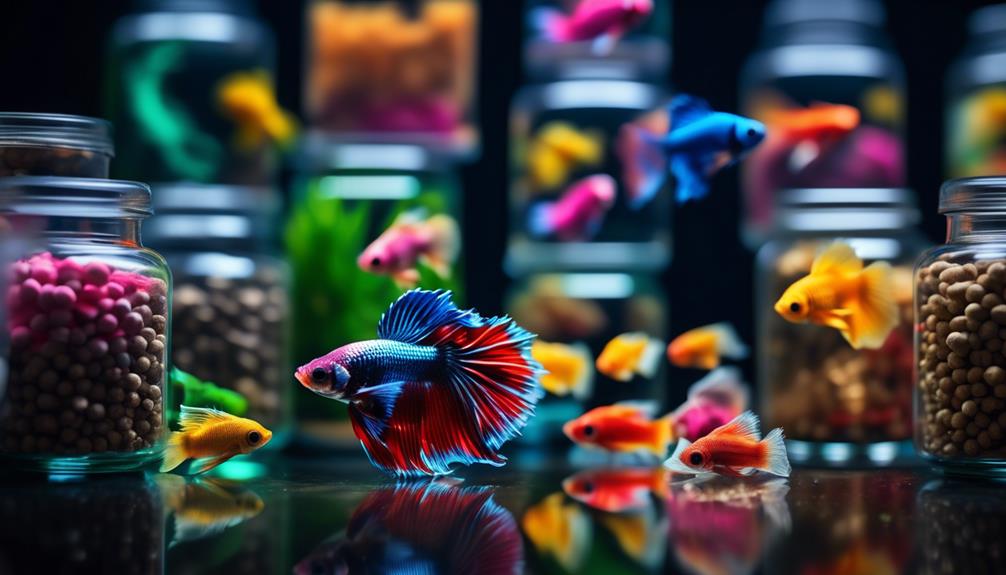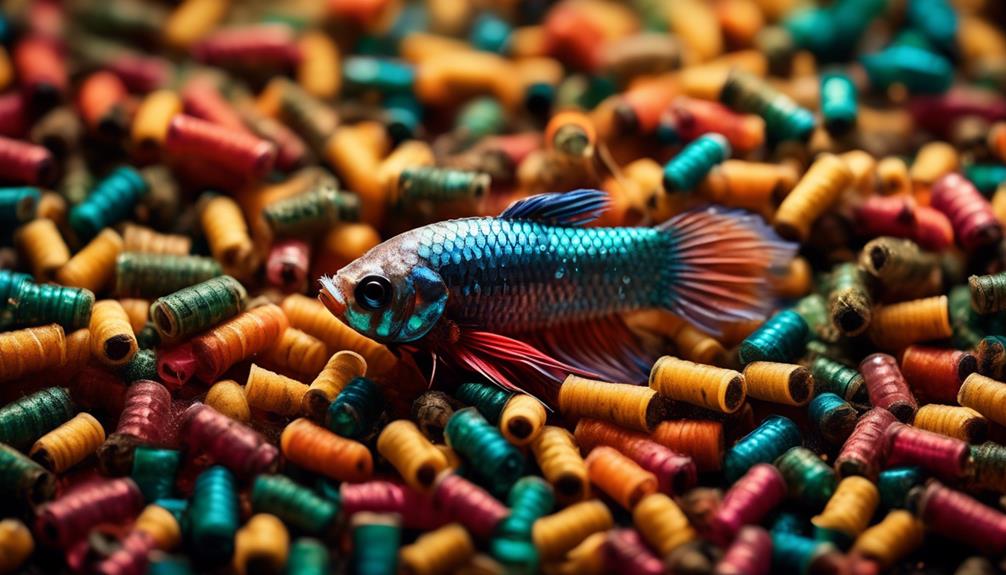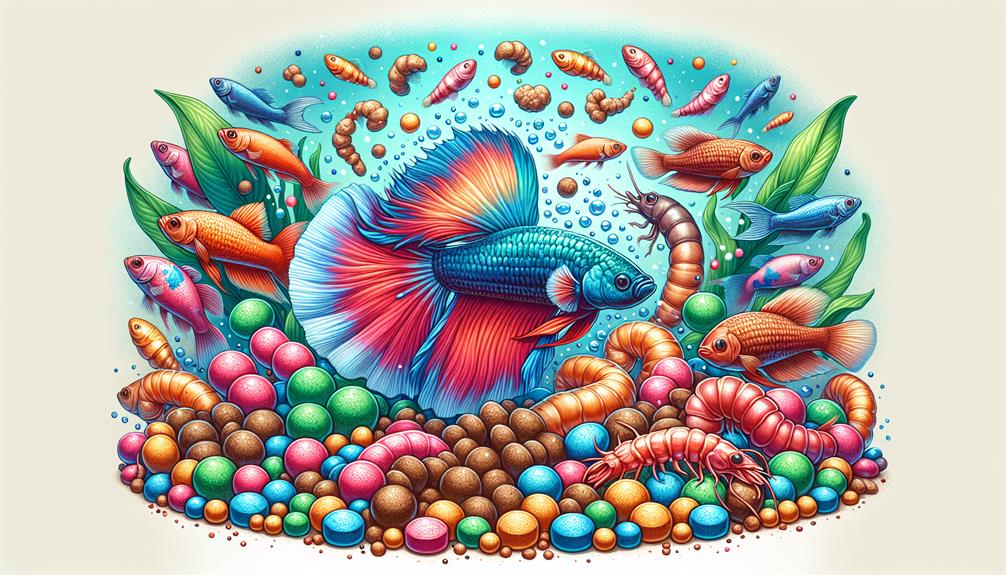Welcome to our comprehensive guide on the top betta fish foods that every betta owner should consider adding to their fish's diet. Providing a well-balanced and nutritious diet is crucial for the overall health and vitality of your betta fish.
In this article, we will explore a selection of must-try betta fish foods, ranging from frozen to live, pellets to freeze-dried, and even insect-based options. By incorporating a variety of these top betta fish foods into your betta's feeding routine, you can ensure a diverse and nutritious diet that promotes their overall well-being.
So, let's dive in and discover the best options for your betta fish's optimal health.
Key Takeaways
- Hikari is a recommended brand for frozen bloodworms and freeze-dried bloodworms.
- Rotating between at least two to three different foods provides a varied diet for betta fish.
- Xtreme Betta Pellets are a good choice for betta fish as they contain high-quality proteins like krill.
- Fluval Bug Bites Tropical Formula is an insect-based pellet that simulates a betta fish's natural diet and is also suitable for other tank mates like tetras and corydoras.
Frozen Foods for Betta Fish
Frozen foods are a highly recommended option for providing a varied and nutritious diet for betta fish. These foods offer several advantages, including convenience, long shelf life, and the preservation of essential nutrients. When it comes to frozen foods for betta fish, Hikari is a recommended brand known for its high-quality products.
The frozen bloodworms, sold in foil-sealed individual cubes or frozen slabs, are particularly popular among betta fish owners. To feed frozen foods to betta fish, simply thaw out the cube and feed a few bloodworms using a pipette or tweezers.
It is important to rotate between at least two to three different frozen foods to ensure a diverse diet for optimal health. By incorporating recommended brands like Hikari, betta fish owners can provide their pets with the nutritious and varied diet they need to thrive.
Live Foods for Betta Fish
Live foods are an important component of a betta fish's diet, as they closely resemble their natural feeding habits and provide essential nutrients for optimal health. There are several benefits of incorporating live foods into a betta fish's diet.
Firstly, live foods stimulate the betta fish's natural hunting instincts, promoting physical activity and mental stimulation.
Secondly, live foods offer a more varied diet, ensuring a wider range of nutrients.
When introducing live foods to betta fish, it is crucial to source them from reputable fish stores that keep them refrigerated to minimize the risk of parasites.
Additionally, it is important to gradually introduce live foods into the betta fish's diet, starting with small quantities and monitoring the fish's response to prevent overfeeding or digestive issues.
Pellets for Betta Fish

Incorporating pellets into a betta fish's diet provides a convenient and nutrient-rich option for ensuring optimal health and well-being. Betta pellets combine essential nutrients in a convenient bite-sized package. Here are some benefits of pellets and tips for feeding them:
- Balanced Nutrition: Pellets contain a balanced mix of proteins, vitamins, and minerals, promoting overall health and vitality in betta fish.
- Easy Digestion: Pellets are designed to be easily digestible, reducing the risk of digestive issues and ensuring efficient nutrient absorption.
- Controlled Feeding: Pellets do not dissolve quickly and float at the water surface, allowing bettas to feed at their own pace and preventing overfeeding.
- Long Shelf Life: Buying a large jar of fish food may lead to staleness. It is recommended to purchase smaller quantities to maintain freshness.
Remember to use the provided scoop to avoid overfeeding and keep the betta fish's tank clean to maintain optimal health.
Freeze-Dried Foods for Betta Fish
Freeze-dried foods offer a convenient and nutrient-rich option for enhancing the diet of betta fish. These foods, such as freeze-dried bloodworms and brine shrimp, provide bettas with essential nutrients while eliminating the need for freezer storage.
When feeding freeze-dried foods, it is important to follow the thawing process to ensure optimal nutritional benefits. Simply soak the freeze-dried food in a small container of tank water for a few minutes until it softens. Once thawed, the food can be portioned out into appropriate-sized feedings for the betta fish.
Any leftovers can be easily removed from the tank to prevent fouling the water. Brands like Hikari offer freeze-dried options that retain the original nutrients and taste through the freeze-drying process, making them a recommended choice for betta fish owners seeking convenience and quality nutrition for their pets.
Insect-Based Pellets for Betta Fish

Insect-based pellets offer a highly nutritious and biologically appropriate option for betta fish diets. These pellets are specifically formulated to simulate a betta fish's insectivore diet and provide them with the necessary nutrients for optimal health.
When considering insect-based pellets for betta fish, it is important to compare different brands to ensure the best quality and benefits for your fish. Some popular brands of insect-based pellets include Fluval Bug Bites Tropical Formula, which is made of black soldier fly larvae. These pellets contain high amounts of quality protein and essential vitamins and minerals.
However, it's worth noting that some bettas may not prefer the slow sinking granules, but other tank mates like tetras and corydoras can help finish any leftovers, making it a great option for community tanks.
Frequently Asked Questions
Can Betta Fish Eat Frozen Foods Exclusively or Should They Be Supplemented With Other Types of Food?
Betta fish can eat frozen foods exclusively, but it is recommended to supplement their diet with other types of food for a balanced nutrition. Incorporating a variety of live, pellet, and freeze-dried foods ensures optimal health and well-being.
How Often Should Betta Fish Be Fed Frozen Foods?
Betta fish should be fed frozen foods 2-3 times a week as part of a varied feeding schedule. Frozen foods offer benefits such as mimicking their natural diet and providing essential nutrients.
Are There Any Potential Risks or Concerns Associated With Feeding Betta Fish Live Foods?
Potential risks of feeding betta fish live foods include the introduction of parasites and diseases into the aquarium. Additionally, overfeeding live foods can lead to water quality issues. It is important to purchase live foods from reputable sources and practice moderation in feeding.
Can Betta Fish Be Overfed With Pellets?
Betta fish can be overfed with pellets, leading to health risks such as obesity and constipation. To prevent this, alternate with other feeding methods like frozen or freeze-dried foods, ensuring a balanced and varied diet.
How Do Freeze-Dried Foods Compare to Frozen Foods in Terms of Nutritional Value for Betta Fish?
Freeze-dried foods are a convenient alternative to frozen foods for betta fish. While freeze-drying retains nutrients, frozen foods tend to be more nutritionally rich. It is essential to provide a varied diet to ensure optimal health.
Conclusion
In conclusion, by incorporating a diverse selection of top betta fish foods into your betta's diet, you can ensure their optimal health and well-being.
From frozen and live foods to pellets and insect-based options, there is a wide range of nutritious choices available.
Remember to provide a balanced diet that mimics their natural feeding habits.
By doing so, you can enjoy the irony of feeding your betta fish a scientifically precise and technically sound meal that they will thrive on.

